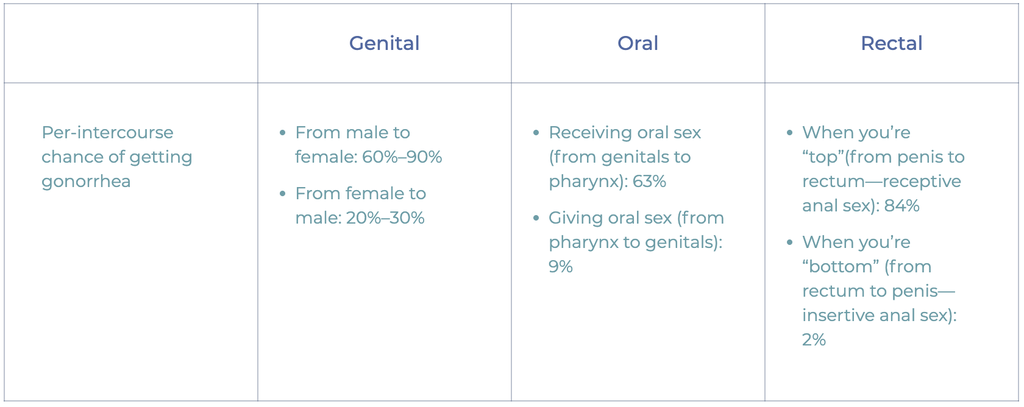Very friendly and super helpful with any questions I had. Very clean and calm atmosphere, all the staff were kind.
Read More
How Many People Get Gonorrhea Every Year?
Posted: Apr 24th, 2024 at 12:00AM

Every day around the world, more than one million STDs are acquired, one of which is gonorrhea, which is one of four curable sexually transmitted diseases. How many people acquire gonorrhea, specifically? Let's look at what the numbers tell us.
How Many People Have Gonorrhea?
While the numbers fluctuate each year, according to the National Association of County and City Health Officials (NACCHO), in 2021, more than 700,000 cases of gonorrhea were reported. This was a 28% increase since 2017.
The Centers for Disease Control and Prevention (CDC) said that in 2022, 648,056 cases of gonorrhea were reported in the United States. That made it the second most common STD in the country for the year.
The trend in rates of gonorrhea has changed over the years. For instance, 2009 brought us a historic low, but then rates increased through 2021. Then, between 2021 and 2022, the US saw a 9.2% decrease.
Regardless, it's likely that these numbers aren't totally accurate. While the symptoms of gonorrhea usually appear two to five days (and even up to months) after infection, some people don’t exhibit any symptoms at all. Thus, they don't receive any medical attention and their case is never reported.
This further highlights the importance of getting tested for STDs if you engage in any sort of sexual contact.
Is Gonorrhea More Common in Men or Women?
Interestingly, some research suggests that more women get gonorrhea, compared to men. One study used 2,754 participants, with 2,534 completing a questionnaire survey and also providing genital tract secretion specimens. 1,106 were male, and 1,428 were female. Eligible participants had received outpatient STD care.
The researchers found that the rate of gonorrhea was significantly higher among women — 88.1%, compared to 68.3% for men. But why? There are many potential reasons. It could be because early infection is sometimes asymptomatic — meaning that the woman shows no signs of infection. Another possible explanation is that women have a larger mucosal surface area. In other words, because of their anatomy, there are more opportunities to become infected. Microlesions that can occur more often in women during sex can also be the culprit.
What Age Do People Most Commonly Acquire This STD?
Are people of certain ages more likely to become infected with gonorrhea? Indeed, it’s particularly common in individuals between the ages of 15 and 24 years old. In fact, about half of all infections fall within this age range. Young women are more prone to STDs, in general, but it could also be that young people don't get tested for STDs as recommended; they don't discuss sexual matters with their primary care provider; or they might have multiple sexual partners, making them more vulnerable to acquiring sexually transmitted diseases.
To be clear, these aren't the only ages where individuals find themselves with gonorrhea. For instance, according to the CDC, in 2022, there were 128,268 cases reported in individuals between the ages of25 and 29 years old. There were 103,072 cases for people between the ages of 30 and 34 years old.
How Likely Are You to Catch Gonorrhea?
You now know that gonorrhea is one of the most common STDs, it's more prevalent in women, and people between the ages of 15 and 24 years old are the most likely to get it. But what’s your chance of becoming infected?
While the numbers fluctuate, the STD Center says that it can vary based on the type of sexual contact (genital versus oral versus rectal), and whether the individual is "giving" versus "receiving."
(Note: Remember, you don't have to have penetrative intercourse to acquire an STD. This is just a myth!)
 Based on these numbers, here are a few takeaways:
Based on these numbers, here are a few takeaways:
- Males are more likely to spread it to females, not the other way around.
- Individuals are more likely to contract gonorrhea while receiving oral sex, not giving it.
- Individuals are more likely to acquire gonorrhea during receptive anal sex, not insertive.
The STD Center also compares the chance of spreading the STD with and without a condom.
 Interestingly, these numbers almost suggest that using a condom doesn't have much of an impact when it comes to preventing the spread of gonorrhea. However, it can still reduce the likelihood. Furthermore, condoms can protect you from other dangerous STDs, as well as unplanned pregnancies.
Interestingly, these numbers almost suggest that using a condom doesn't have much of an impact when it comes to preventing the spread of gonorrhea. However, it can still reduce the likelihood. Furthermore, condoms can protect you from other dangerous STDs, as well as unplanned pregnancies.
Still, knowledge is power. Get tested for STDs so that you can protect yourself and your partner(s).
Is Gonorrhea Curable?
Thankfully, yes, gonorrhea is curable with prompt and adequate treatment. Commonly, infected individuals will receive an intramuscular injection of ceftriaxone, which helps to stop the bacteria from growing. Do note, however, that the injection will not treat any damage already caused by the STD. It will only prevent it from causing further harm.
How to Get Tested
Getting tested for gonorrhea is quick and easy with e7 Health. As you notice below, gonorrhea should always be tested together with chlamydia because of similar symptoms. We offer several options, depending on your needs and preferences:
- Chlamydia and gonorrhea
- Oral chlamydia and gonorrhea
- Several different panels, including the 8-panel test, 10-panel test, and Premier Complete STD Panel Test, among others.
Testing is private and discreet, and no physical exam is needed. We have multiple locations with Saturday appointments available, and most test results are available within 48 hours. You can access these in our cloud-based patient portal, via email, or even via pick-up. Should you test positive, one of our clinicians will call you to discuss your results, although you can speak to one before or after your appointment, regardless!
And importantly, while other clinics only test, we test and treat. Should you learn that you've acquired an STD, we'll work with you on the next steps of your treatment.Book an appointment today.

I came to E7 health for a physical exam for employment. Staff was very professional, And I was in and out in thirty minutes
Read More
Staff was extremely friendly, I was able to walk in without an appointment.
Read More
Very friendly, informative, and well versed. Felt well taken care of by the doctor and all the staff. Fast, friendly, considerate, all staff met.
Read More
I was here for an employment physical. They are amazing! I was in and out in less than 10 mins.
Read More
J was super helpful. Very quick and easy.
Read More
Rachel was amazing and I was in and out so quick ! Ready to start my new job ! Thanks 🥰
Read More
J was awesome at talking me through my first time getting blood taken. The doctor that also did my physical was quick and very thorough when letting me know the next steps for getting the test results back :)
Read More
















